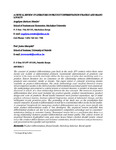A CRITICAL REVIEW OF LITERATURE ON PRODUCT DIFFERENTIATION STRATEGY AND BRAND LOYALTY
Abstract
The concept of product differentiation goes back to the early 20th century when there were hardly any models of differentiated products. Incremental differentiation of products and services is the main variable that helps define the key aspect of value that marketing adds to a product. Extant literature has no consensus on the relationship between differentiation of products and consumer loyalty to brands. This paper aimed at critically reviewing studies available on product differentiation. The study methodology used involved literature review where empirical studies in the field of product differentiation and brand loyalty were examined. The methodology also involved a critical review of relevant theories. A number of theories were discussed in search of a clear relationship between the two concepts. The measures of product differentiation that were used included the product quality, product innovativeness, product design and costs of products. Brand loyalty measures were product repurchase, top of mind product, advocacy metrics, business referral frequencies, extent of behavioral change, and the willingness to pay premium price. The grounding of the study was on the assumption that various measures of product differentiation would have a substantial effect on the brand loyalty. A conceptual framework for measuring product differentiation and to give more insight into what product differentiation really is was developed. The empirical review indicated that differentiated products are key to an organization’s competitive advantage and to customers’ satisfaction leading to customer loyalty. Theoretical review led to a conclusion that there is a strong relationship between product differentiation and brand loyalty. This critical review of empirical literature highlighted some gray areas hence future scholars should review critical issues like product differentiation and customer satisfaction, brand awareness and performance; and perceived service quality and reputation.

